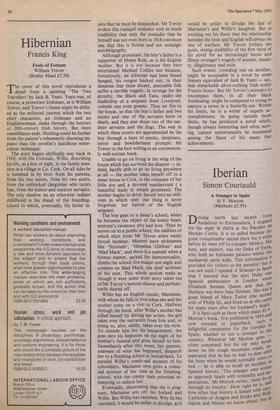Hibernian
Francis King
Fools of Fortune William Trevor (Bodley Head £7.50) rr he cover of this novel reproduces a detail from a painting 'The Two Travellers' by Jack B. Yeats. Yeats was, of course, a protestant Irishman, as is William Trevor, and Trevor's theme might be defin- ed as the enforced journey which the two chief characters, an Irishman and an Englishwoman, make through the horrors of 20th-century Irish history. But there resemblance ends. Nothing could be further from the painter's vehemently churning im- pasto than the novelist's fastidious water- colour technique.
The story begins idyllically way back in 1918, with the Irishman, Willie, describing his life, as a boy of eight, in the family man- sion in a village in Co. Cork. On all sides he is hemmed in by love: from his parents, from his two sisters, from his two aunts, from the unfrocked clergyman who tutors him, from the indoor and outdoor servants. The only shadow on an otherwise radiant childhood is his dread of the boarding- school to which, eventually, his father in-
sists that he must be despatched. Mr Trevor evokes this tranquil existence with so much credibility that only the reminder that he himself was not even born in 1918 convinces one that this is fiction and' not nostalgic autobiography.
Although protestant, the boy's father is a supporter of Home Rule, as is his English mother. But it is not because they have entertained Michael Collins but because, fortuitously, an informer had been found hanged, his tongue hacked out, in their demesne that these decent, peaceable folk suffer a terrible tragedy. In revenge for the atrocity, the Black and Tans, under the leadership of a sergeant from Liverpool, commit one even greater. They set fire to the house, so that the boy's father and two sisters and one of the servants burn to death, and they also shoot two of the out- door servants and the dogs. The way in which these events are apprehended by the boy through a haze of smoke, sleepiness, terror and bewilderment prompts Mr Trevor to the best writing in an uncommon- ly well-written book.
Unable to go on living in the wing of the house which has survived the disaster — in- deed, hardly able to go on living anywhere at all — the mother takes herself off to a mean house in Cork, in the company of her little son and a devoted maidservant ( a beautiful study in simple goodness). The mother begins to drink herself into an obli- vion in which only one thing is never forgotten: her hatred of the English sergeant.
The boy goes to a dame's school, where he becomes the object of the lonely head- mistress's ravenous pity and love. Then he moves on to a public school, the oddities of which elicit from Mr Trevor some wanly forced humour. Masters have nicknames like 'Scrotum', 'Hopeless Gibbon' and 'Mad Mack', and there is a scandal when a former master, sacked for homosexuality, climbs the school fire-escape one night and urinates on Mad Mack, the chief architect of his ruin. This whole section reads as though it were some short story taken out of Mr Trevor's bottom drawer and perfunc- torily dusted off.
Willie has an English cousin, Marianne, with whom he falls in love when she and her mother come on a visit to Cork. Halfway through the book, after Willie's mother has killed herself by slitting her wrists, the girl takes over the narration from him and, in doing so, also, oddly, takes over his style. To console him for his bereavement, she goes into his bedroom on the night of his mother's funeral and gives herself to him. Immediately after this event, her parents, unaware of what has happened, despatch her to a finishing school in Switzerland. To parallel Willie's comic-sad account of his schooldays, Marianne now gives a comic- sad account of her time at the finishing- school, with the creepy male principal at- tempting to seduce her.
Eventually, discovering that she is preg- nant, Marianne sets off for Ireland and Willie. But Willie has vanished. Why he has vanished, it would be unfair to divulge, as it would be unfair to divulge the fate of Marianne's and Willie's daughter. But in working out his thesis that the relationship between the Irish and English will always be one of warfare, Mr Trevor forfeits the quiet, strong credibility of the first third of his novel for an increasingly hectic and flimsy revenger's tragedy of murder, insani- ty, illegitimacy and exile.
Such events, crowding one on another, might be acceptable in a novel by some literary equivalent of Jack B. Yeats — say, that remarkable all-or-nothing Irish writer Francis Stuart. But Mr Trevor's attempts to encompass them, in all their black foreboding, might be compared to trying to capture a raven in a butterfly-net. Within his limits, he is a writer of superb ac- complishment. In going outside those limits, he has produced a novel which, though always interesting and often mov- ing, cannot unfortunately be numbered among the finest of his many fine achievements.










































 Previous page
Previous page